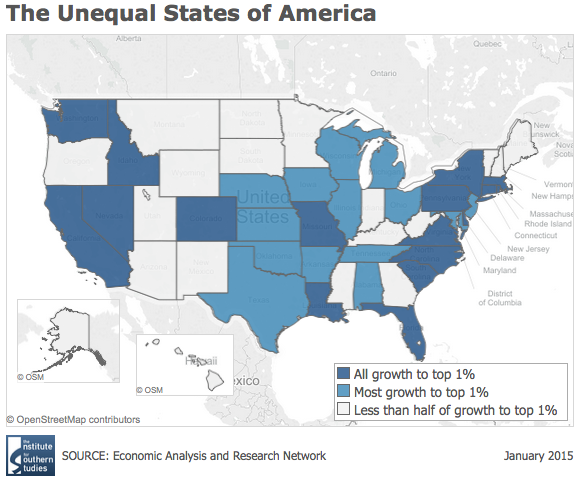INSTITUTE INDEX: States of inequality

In 39 states, the wealthiest 1 percent captured at least half of the income growth between 2009 and 2012. In 17 states of those states, the 1 percent captured it all. (Click on map to see a larger version.)
Percent of U.S. states that have experienced widening income inequality in recent decades: 100
Of the 50 states, number where the wealthiest 1 percent captured at least half of all income growth between 2009 and 2012: 39
Number of states where all of the income growth during that period went to the wealthiest 1 percent: 17
Number of those dramatically unequal states that are in the South: 5*
In Florida, among the most unequal states, percent change in the top 1 percent's income from 2009 to 2012: +39.5
Percent change in income for Florida's bottom 99 percent in that period: -7.1
Percent share of total income growth captured by Florida's wealthiest: 259.9
Income growth captured by the wealthiest residents of South Carolina, where the bottom 99 percent lost income: 192
By the wealthiest residents of, respectively, North Carolina, Louisiana and Virginia, among the other most unequal states: 188, 137, 134.8
Rank of West Virginia among the least unequal states, and the only one where income fell for the top 1 percent while rising for the bottom 99 from 2009 to 2012: 1
Average income of the top 1 percent in the South: $1.1 million
In the United States: $1.3 million
In Florida: $1.4 million
Average income of the bottom 1 99 percent in the United States: $43,713
In the South: $42,113
Percentage points by which the income share of the top 1 percent grew under average state policies between 1980 and 2005: 11
Percentage points by which the top 1 percent's income would have grown had states pursued more equality-enhancing policies such as higher taxes on the wealthy, lower taxes on the poor and worker-friendly labor regulations such as state minimum wages and the absence of right-to-work laws: 1.6
Under a tax reform plan proposed this month by President Obama in response to growing inequality, amount the poorest fifth of Americans would save on their federal tax bill, on average: $174
Additional amount the wealthiest fifth would have to pay: $1,818
Number of likely GOP presidential contenders who spoke out against income inequality this week at a private meeting of wealthy donors: 3
* Florida, Louisiana, North Carolina, South Carolina and Virginia.
(Click on figure to go to source. Many of the numbers in this index are from "The Increasingly Unequal States of America" by the Economic Analysis and Research Network.)
Tags
Sue Sturgis
Sue is the former editorial director of Facing South and the Institute for Southern Studies.
